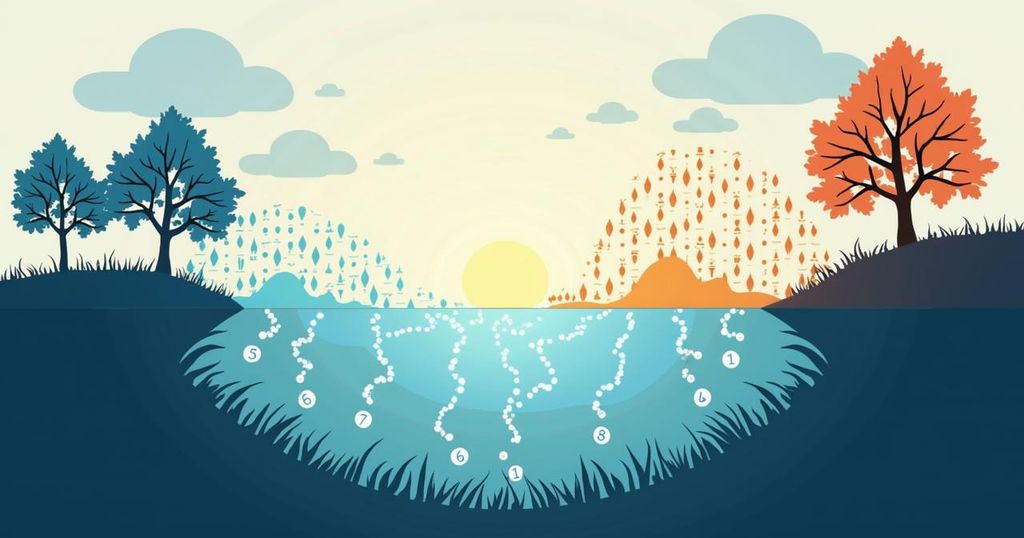The United Nations warns that the world’s water cycle is becoming increasingly erratic due to climate change, resulting in severe droughts and floods. The 2023 WMO report reveals record low levels in rivers, significant glacier ice loss, and stark predictions regarding future freshwater accessibility. With three billion people already facing inadequate access to clean water, immediate action is required to address the impacts of a changing climate on global water resources.
The United Nations has issued a grave warning that the global water cycle is becoming increasingly erratic, reflecting the severe impacts of climate change. The United Nations’ World Meteorological Organization (WMO) highlighted alarming trends in a recent report, indicating that last year marked the driest conditions for rivers in over three decades, alongside record glacier ice loss and a notable uptick in flooding incidents. WMO Secretary-General Celeste Saulo emphasized, “Water is the canary in the coalmine of climate change,” signifying that fluctuating water patterns and extreme weather events serve as precursors to broader environmental crises. The erratic shifts in the water cycle have consequential ramifications for human populations, ecosystems, and economies. In the past year, the world experienced unprecedented droughts and floods, compounded by heightened temperatures that contributed to these extreme weather patterns. The occurrences were exacerbated by natural climatic phenomena like La Niña and El Niño, but the influence of anthropogenic climate change has become increasingly pronounced. Saulo noted, “A warmer atmosphere holds more moisture, which is conducive to heavy rainfall. More rapid evaporation and drying of soils worsen drought conditions.” The climate crisis has rendered water resources either excessively abundant or alarmingly scarce, placing numerous countries in precarious situations. Africa has borne the brunt of this crisis, with devastating incidents such as the September 2023 collapse of two dams in Libya due to major flooding, which yielded over 11,000 casualties and affected 22 percent of the population, according to WMO data. Other regions, including the Greater Horn of Africa and parts of Central Africa, have faced significant flooding as well. An alarming statistic indicates that 3.6 billion people encounter inadequate fresh water access at least once monthly, with expectations that this figure will escalate to over five billion by 2050. More than half of river catchments have been drier than usual for three consecutive years, and the inflow to reservoirs has consistently fallen short of normal levels over the past five years. Glacial melt has reached critical rates, with approximately 600 billion tonnes of water lost – the largest loss recorded in 50 years. The WMO calls for enhanced monitoring of freshwater resources to develop early warning systems that could mitigate the adverse effects of water-related disasters. Saulo reiterated, “We cannot manage what we do not measure.” Additionally, Stefan Uhlenbrook, the director of the WMO’s hydrology, water, and cryosphere department, stressed the necessity for investments in water conservation and infrastructure to protect communities from hazards. However, he cautioned that returning to a predictable water cycle would pose significant challenges, stating, “The only thing we can do is to stabilize the climate, which is a generational challenge.”
The article underscores the critical state of the world’s water cycle, leveraging a report from the United Nations’ World Meteorological Organization (WMO) to elucidate the dire consequences of climate change on global water resources. It highlights key phenomena such as extreme flooding and drought occurrences, emphasizing how such events are expected to increase as a result of unpredictable climate variations largely driven by human activities. The inherent connection between water security and the impacts of climate change is examined, drawing attention to alarming statistics regarding freshwater accessibility and the significant loss of glacial mass. This context is essential for understanding the urgency behind the UN’s warnings and the need for immediate global action to address water resource management in the face of climate challenges.
In conclusion, the United Nations’ ongoing assessments highlight the disturbing trend of increasing water cycle unpredictability due to climate change. Severe weather events, combined with growing freshwater scarcity and unprecedented glacier melt, signal a critical call to action for global policymakers. The need for robust monitoring systems and sustainable water management practices has never been more urgent. Should immediate measures not be implemented, the future of global water security and human welfare will remain at significant risk.
Original Source: phys.org






